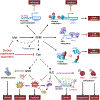Dietary methionine restriction in cancer development and antitumor immunity
- PMID: 38383161
- PMCID: PMC11096033
- DOI: 10.1016/j.tem.2024.01.009
Dietary methionine restriction in cancer development and antitumor immunity
Abstract
Methionine restriction (MR) has been shown to suppress tumor growth and improve the responses to various anticancer therapies. However, methionine itself is required for the proliferation, activation, and differentiation of T cells that are crucial for antitumor immunity. The dual impact of methionine, that influences both tumor and immune cells, has generated concerns regarding the potential consequences of MR on T cell immunity and its possible role in promoting cancer. In this review we systemically examine current literature on the interactions between dietary methionine, cancer cells, and immune cells. Based on recent findings on MR in immunocompetent animals, we further discuss how tumor stage-specific methionine dependence of immune cells and cancer cells in the tumor microenvironment could ultimately dictate the response of tumors to MR.
Keywords: antitumor immunity; gut microbiota; methylation; redox homeostasis; sulfur metabolism.
Published by Elsevier Ltd.
Conflict of interest statement
Declaration of interests The authors declare no competing interests.
Figures




References
Publication types
MeSH terms
Grants and funding
LinkOut - more resources
Full Text Sources
Medical

